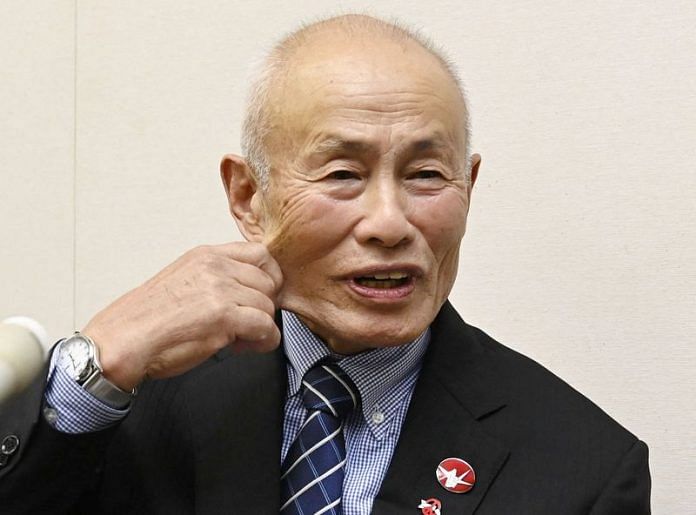By Gwladys Fouche, Nora Buli
OSLO (Reuters) -Japanese organisation Nihon Hidankyo, a grassroots movement of atomic bomb survivors from Hiroshima and Nagasaki, won the Nobel Peace Prize on Friday, in a warning to countries who have nuclear weapons not to use them.
Witnesses to the only two nuclear bombs ever to be used in conflict, known in Japan as “Hibakusha”, have dedicated their lives to the struggle for a nuclear-free world.
“Hibakusha is receiving the Peace Prize for its efforts to achieve a world free of nuclear weapons and for demonstrating through witness testimony that nuclear weapons must never be used again,” the Norwegian Nobel Committee said in its citation.
“The Hibakusha help us to describe the indescribable, to think the unthinkable, and to somehow grasp the incomprehensible pain and suffering caused by nuclear weapons,” the committee said.
“I can’t believe it’s real,” Nihon Hidankyo co-chair Toshiyuki Mimaki told a press conference in Hiroshima, site of the Aug. 6, 1945 atomic bombing during the closing stages of World War Two, as he held back tears and pinched his cheek.
Mimaki, a survivor himself, said the award would give a major boost to its efforts to demonstrate that the abolition of nuclear weapons was possible.
“(The win) will be a great force to appeal to the world that the abolition of nuclear weapons and everlasting peace can be achieved,” he said. “Nuclear weapons should absolutely be abolished.”
WARNING TO NUCLEAR NATIONS
Without naming specific countries, Joergen Watne Frydnes, chair of the Norwegian Nobel Committee, warned that nuclear nations should not contemplate using atomic weapons.
“In a world ridden (with) conflicts, where nuclear weapons is definitely part of it, we wanted to highlight the importance of strengthening the nuclear taboo, the international norm, against the use of nuclear weapons,” Frydnes told Reuters.
“We see it as very alarming that the nuclear taboo … is being reduced by threatening, but also how the situation in the world where the nuclear powers are modernising and upgrading their arsenals.
Frydnes said the world should listen to the “painful and dramatic stories of the Hibakusha”.
“These weapons should never be used again anywhere in the world … Nuclear war could mean the end of humanity, (the) end of our civilisation,” he said in an interview.
Russian President Vladimir Putin has repeatedly warned the West of potential nuclear consequences since Russia’s 2022 full-scale invasion of Ukraine.
He declared last month that Russia could use nuclear weapons if it was struck with conventional missiles, and that Moscow would consider any assault on it supported by a nuclear power to be a joint attack.
This month, North Korean leader Kim Jong Un said his country would speed up steps towards becoming a military superpower with nuclear weapons and would not rule out using them if it came under enemy attack, while widening conflict in the Middle East has prompted some experts to speculate that Iran may restart its efforts to acquire a nuclear bomb.
SECOND JAPANESE WINNER
Next year will mark the 80th anniversary of the dropping of nuclear bombs by the United States on Hiroshima and Nagasaki in August of 1945.
With the award, the committee was drawing attention to a “very dangerous situation” in the world, with China-U.S. relations, and Russia-U.S. relations, “the most toxic” since the end of the Cold War, according to Dan Smith, head of the Stockholm International Peace Research Institute.
“If there is a military conflict, there is a risk of it escalating to nuclear weapons … They (Nihon Hidankyo) are really an important voice to remind us about the destructive nature of nuclear weapons,” he told Reuters.
Smith also said the Committee has achieved “a triple strike” with the prize: drawing attention to the human suffering of nuclear bomb survivors; the danger of nuclear weapons; and that the world has survived without their use for nearly 80 years.
The Norwegian Nobel Committee has regularly put focus on the issue of nuclear weapons, most recently with its award to ICAN, the International Campaign to Abolish Nuclear Weapons, who won the award in 2017.
It is the second Nobel Peace Prize for a Japanese recipient in the prize’s 123-year history, 50 years after former Prime Minister Eisaku Sato won it in 1974 “for his contribution to stabilize conditions in the Pacific Rim area and for signing the Nuclear Non-Proliferation Treaty”.
The peace prize is the fifth Nobel awarded this week, after literature, chemistry, physics and medicine.
Imprisoned Iranian women’s rights advocate Narges Mohammadi won in 2023.
The Nobel Peace Prize, worth 11 million Swedish crowns, or about $1 million, is due to be presented in Oslo on Dec. 10, the anniversary of the death of Swedish industrialist Alfred Nobel, who founded the awards in his 1895 will.
(Reporting by Gwladys Fouche, Nora Buli, Tom Little and Nerijus Adomaitis in Oslo, Satoshi Sugiyama, Kantaro Komiya and Chang-Ran Kim in Tokyo; editing by Terje Solsvik and Alex Richardson)
Disclaimer: This report is auto generated from the Reuters news service. ThePrint holds no responsibilty for its content.






